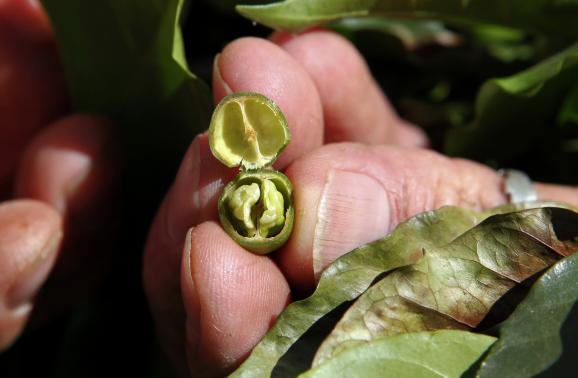 s followed by the worst drought in decades in Brazil have pushed even the smallest family farmers to buy modern machinery rather than rely on increasingly scarce and expensive labor.
s followed by the worst drought in decades in Brazil have pushed even the smallest family farmers to buy modern machinery rather than rely on increasingly scarce and expensive labor.Brazil's crop supply agency Conab noted an "intense trade in machinery, mainly harvesters," in the main coffee-growing states of São Paulo and Minas Gerais this season, in response to a 46 percent average rise in day laborer wages from a year earlier.
Large producers in Brazil, which supplies about a third of the world's coffee, started buying machinery, much of it from the United States, 15 years ago. Now modernization has become a necessity for cash-strapped small farmers.
Michael Reguim, 26, purchased an automated harvester in 2008 and this season became the first in his mountain community of 82 farmers to buy a machine that strips the skin off coffee cherries, a job he previously paid four people to do.
"You used to buy machinery to try to improve margins – now you do it to survive," said Reguim, showing off the two-storey contraption imported from Colombia that he bought and installed for 72,000 reais ($31,718), with a government loan.
The machine has the added benefit of reducing water consumption in a region that saw drought sap at least 30 percent off 2014 coffee output. Reguim originally expected to harvest 4,000 bags of coffee in southern Minas Gerais this year.
"Now, I'll be happy with 2,000. If I hadn't mechanized I would not survive this," he said of the drought.
Coffee is the only major export commodity that is still produced by a significant number of small families in Brazil, which has evolved from a net food importer into a modern agricultural superpower over the last few decades with grain fields as sophisticated as those in the United States.
In southern Minas Gerais, a region responsible for a quarter of Brazil's coffee, half of all harvesting is now automated, up from 20 percent five years ago, said Luiz Reis, an agronomist at the government's rural assistance agency Emater. He expects field work there to be 70 percent automated next year. Some remote mountain regions are impossible to harvest mechanically.
Bruno Reguim Filho, Michael Reguim's cousin, bought an automated harvester with his brother last year and plans to pay off a loan he used to pay for it over 10 years. Unable to find willing coffee pickers in 2013, he hired 20 migrant workers from Bahia state, 1,000 kilometers away.
Now, Bruno's harvesting costs dropped from 300 reais per hectare to 100 reais per hectare with automation, he said, as a whirring machine whisked the last of 2014's ripe coffee cherries into a giant sack.
Even though arabica prices rose 55 percent in the last 12 months to their highest in two years after the drought, farmers said they are still struggling to compensate for smaller output.
"Even with mechanization, costs are very high. Anyone who isn't mechanized is not able to make ends meet," said Luiz de Castro Junior, an economist and associate professor at the federal university in Lavras, Minas Gerais.





